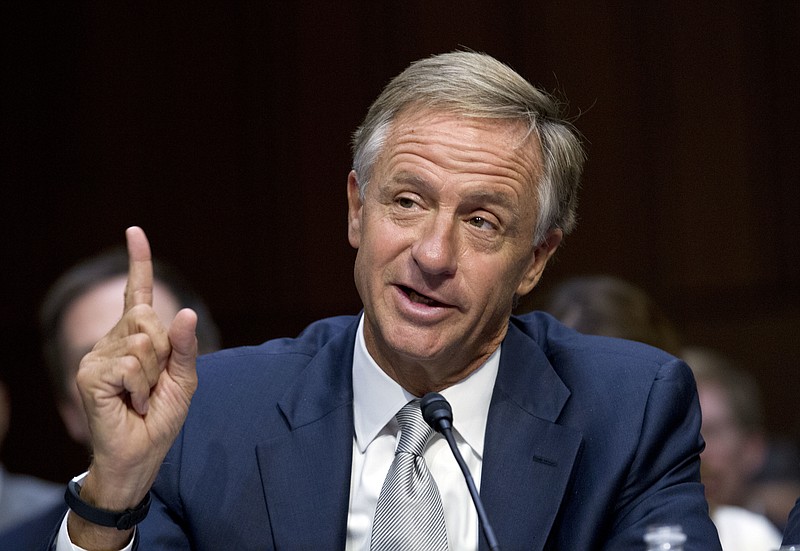NASHVILLE - Tennessee's opioid crisis and ways to fight it were on full display during Gov. Bill Haslam's budget hearings this week as official after official presented various proposals totaling millions of dollars to combat the addictive painkillers and deal with their devastation.
Children's Services Commissioner Bonnie Hommrich, for example, pitched a $2.1 million plan to hire 30 more case workers, pointing to a 500-child jump in department custody cases from 8,100 to 8,500 children.
"We believe a lot of that is the result of the opioid crisis," Hommrich told the governor and top administration officials earlier this week.
Meanwhile, Tennessee Bureau of Investigation Director Mark Gwyn said he certainly could use the 25 new anti-drug agents recommended earlier this year by a opioid task force created by House Speaker Beth Harwell, R-Nashville.
"I can spread them throughout the state and let them come together as a unit and go into these areas," Gwyn told the governor of increasing the number of TBI agents from 125 to 150. "I really believe we can make a difference."
Haslam listened to those and other ideas, many of them generated by his own task force created in mid-2014.
Over the last several years, Haslam, a Republican, has taken a number of steps to address issues in his state, which has one of the nation's top problems with deadly legal and illegal painkillers.
"What we're trying to do is touch all those bases," Haslam told the Times Free Press as his public budget hearings ended Thursday afternoon. "Because this is not a silver bullet deal. It's going to take a lot of different things in a lot of different places."
Standing beside him was Mental Health and Substance Abuse Commissioner Marie Williams, who has headed the governor's 3 1/2-year effort with a number of proposals springing from that.
Williams, the last commissioner or agency head to present overall budget proposals, asked Haslam for $10 million to continue the department's own substance abuse treatment efforts for an additional 4,200 people who suffer from opioid use disorder, which includes addiction.
Last year, Haslam provided $6 million for the program, which Williams coupled with an $18 million federal grant. She hopes to do the same with the $10 million she's now seeking with another $18 million federal grant.
The money goes to providers for a continuum of services, ranging from intensive outpatient treatment to medically monitored detox in residential settings and partial hospitalization for opioid treatment. It's not just for people with prescription opioid problems, but for those with addictions to painkillers including heroin.
To illustrate the magnitude of Tennessee's painkiller problem, Williams said figures from the Tennessee Hospital Association show that 40,000 Tennesseans last year showed up in emergency rooms with opioid disorder diagnoses.
Three hundred thousand Tennesseans have an opioid misuse prevalence problem, including 82,000 who are addicted to opioids, Williams said.
Williams said she and other officials have now offered their "suggestions" to the governor. The governor's working group, she said, included Harwell, who is running to replace the term-limited Haslam, as well as Lt. Gov. Randy McNally's representatives and other commissioners.
Others offering up ways to address problems this week included the University of Tennessee, which is seeking $3 million for its Center for Addiction Medicine Foundation to devise viable treatment programs.
"We have a head start nationally in this effort," UT System President Joe DiPietro told Haslam.
Asked whether the money will be there for all the proposals, Haslam said, "I don't know if I can promise you we can cover all those bases, but I think all of us would agree the problem with us in Tennessee, opiates, is No. 1 or it's really at the top of the list."
The governor said he hopes to "devote some real dollars. I can't tell you what that'll be. We haven't worked through it. But it's a real problem all across the state. You can't solve everything with money, but I think we will need to address a bigger portion of our budget going forward."
Contact Andy Sher at asher@timesfreepress.com or 615-255-0550. Follow him on Twitter @AndySher1.
